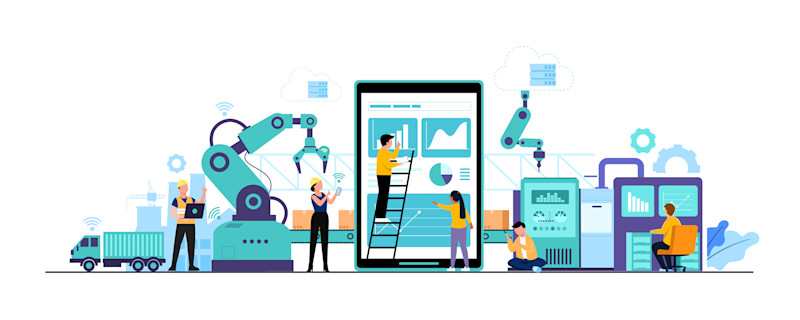TECHNOLOGY
Data-Driven Manufacturing Demands a Proactive Approach to Information Systems
Machine learning, artificial intelligence, digital twin, continuous improvement, closed-loop manufacturing, and the metaverse are all ideas and technologies based on a backbone of data. This has created a dependency on information systems internal and external to the organization. Before this reliance, managing these systems was handled as things broke – a reactive approach. Due to the new critical roles assigned to these technologies, manufacturers are shifting to a proactive approach and investing in policies, procedures, hardware, security, and talent. This cultural change drives information infrastructure to be part of an organization’s capital expenses and strategic planning, significantly impacting the role of the manager or director of a firm’s information systems. As a result, their importance in strategic planning will increase and be an invaluable change for the future.
INTELLIGENCE
Automation Technologies’ Faster Growth
University studies point to a strong relationship between recessions and sudden bursts of expansion in automation and digital tech investment. Researchers at the Universities of Zurich and British Columbia found that 88% of job losses over the past three recessions occurred in automatable occupations.
Automated manufacturing technologies will expand sooner and faster than the manufacturing technology market as a whole over the next two years. Figures from AMT’s U.S. Manufacturing Technology Orders (USMTO) Report are evidence to suggest this is true.


The graphic shows that the growth in advanced automated machinery categories outpaced total metal cutting orders handsomely. By contrast, orders for machinery where advances in the latest automation technologies are not fully deployed have grown at a slower pace.
We should expect to see continued acceleration of growth in manufacturing automation where demand for goods continues to improve while labor shortages prevail.
SMARTFORCE
Intel, Dell, and AACC Launch Artificial Intelligence Incubator Network
In January at the American Association of Community Colleges (AACC) Workforce Development Institute (WDI) conference, AACC, Intel, and Dell announced the formation of the AACC AI Incubator Network (AIIN), an initiative to build artificial intelligence (AI) incubators that will combine industry expertise with the community college system in the United States.
AI has become an increasingly important and relevant field of study across multiple occupational areas and industry sectors, especially in manufacturing. Each AIIN location, whether physical or virtual, will serve as a solution center for its community or talent pool for local labor markets.
AACC will build this network quickly, elevating a national dialogue and providing a set of coordinated resources to the wider community college system. A minimum of one college per state will be encouraged to join. For more information about AIIN, visit aacc.nche.edu/aiin.
INTERNATIONAL
Global Trade Regs – Are You Up to Speed?
Do you import or export? Are you up to speed on regulations and conformity requirements? Apparently, not everyone is. Recently a shipment of manufacturing technology heading into the United States was turned around due to a single piece of wood bracing not having the required ISPM-15 marking – a 15-year-old global regulation! To add insult to injury, the U.S. importer was hit with a six-figure fine. Ouch!
There is a lot going on in regulations. The UK, now exited from the EU, recently implemented the UK Conformity Assessed (UKCA) requirement to replace using the EU’s Conformité Européen (CE) standard. Speaking of CE, some directives are under review for changes affecting manufacturing technology. Globally, the Harmonized System introduced a classification for additive manufacturing (AM) products. AM also has a new ISO standard. Be sure your broker is updated on changing international trade regulations. AMT is always available for updates and advice.
ADVOCACY
Your Customers Should Act Now To Take Full Advantage of Bonus Depreciation
In 2017, bonus depreciation for purchases of qualified property, including manufacturing technology, was temporarily increased from 50% to 100% as part of the Tax Cuts and Jobs Act. However, this valuable incentive to make businesses more competitive begins phasing out in 2023. Manufacturers should let their customers know that in order to take advantage of the full deduction, they must act now to make their purchases and place them in service by the end of the year.
For readers unfamiliar with bonus depreciation, the provision permits companies to expense a percentage of their manufacturing technology purchases in the year they were purchased and placed in service, rather than depreciating them over time. It is intended as an incentive to help businesses, especially small ones, become more efficient and productive by allowing them to recover the costs of newly-purchased assets more quickly. Making 100% expensing permanent or, at minimum, extending it beyond this year, is a top priority for AMT.






